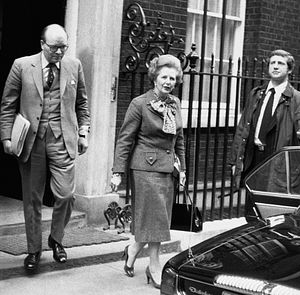U.S. President Donald Trump was prepared to launch military strikes against Iran last night in retaliation for the downing of a $130 million surveillance drone in the Strait of Hormuz but reversed course at the last minute, according to U.S. media reports.
While a number of senior administration officials are reportedly continuing to favor a military response, the president’s decision to pull back from strikes for the time being, supported by senior Pentagon officials, appears consistent with his general disinclination to engage in military action.
Nonetheless, Trump, if pushed into military action by his hawkish advisers, would not be the first democratically-elected politician who could potentially benefit at the polls from a short war.
The idea of war as a panacea to domestic political troubles is as old as political history itself. The best modern blueprint, for a short, sharp military campaign that delivered what a politician remains the Falklands War in 1982. The ten-week military conflict in the South Atlantic between Argentina and Great Britain was the largest air-naval combat operation between conventional military forces since the end of the Second World War.
The result of the British victory in the war was not only the overthrowing of the brutal Argentinian dictatorship, but also the securing of then-Prime Minister’s Margaret Thatcher’s political future by delivering to the British people something that they had not enjoyed since 1945: A clear military success. The British military triumph came at the cost of 258 British dead. (Argentine losses were 649 killed.) Over 2,000 men were wounded on both sides.
The quick conclusion of the conflict, however, overshadowed that it was a desperate military gamble and British victory as much a result of Argentinian incompetence and sheer luck than British military prowess.
The Argentinians, for example, neglected to deploy crucial military assets (e.g., attack helicopters) and the majority of conscripted Argentine troops had dug into static defense positions, giving the initiative to the British.
While the Argentine navy and air force broke through British defenses on numerous occasions, their bombs and torpedoes failed to detonate repeatedly. British landings were conducted without British forces first establishing air superiority, which resulted in the sinking of several British ships and the loss of all but one of the invasion force’s transport helicopters. (The British lacked airborne early warning aircraft to detect incoming Argentinian fighter jets.)
The war was short, but bloody with individual acts of bravery on both sides, next to the more horrible aspects that any conflict produces.
The military victory was a turning point for Margaret Thatcher’s image and political fortunes. Prior to the war, opinion polls showed her to be the most unpopular prime minister in British history. Yet, her new image as a wartime leader ensured a landslide victory for her and the Conservative Party in the general elections of 1983. The war paved the way for what is now known as Thatcherism and it forever cemented Margaret Thatcher’s image as the “Iron Lady” in the eyes of the British public.
While some commentators have already derided Trump’s decision to pull back from military strikes yesterday as weakness, there are two points worth considering from the Falklands conflict.
First, Thatcher would have likely reconsidered sending a naval task force had there been a high risk of causing tens of thousands of civilian and military casualties. Second, the prospect that the war might turn into a regional conflict involving several states would also probably have changed her risk calculus. For example, she refused to bomb military installations on the Argentinian mainland.
The unsettling major takeaway from the conflict in 1982 is that it appears to confirm that few things boost the popularity of a democratically elected politicians more than a short, sharp military conflict against an authoritarian regime.
One crucial difference between escalating U.S.-Iran tensions this week and the 1982 conflict, is that Argentina at the time was clearly seen as the aggressor, while the current crisis is perceived to be primarily driven by hawkish advisers within the Trump administration.
Nonetheless, despite the apparent recent decision to deescalate tensions, the danger remains that the incumbent U.S. administration might embark upon a course of action that could lead to military conflict under misguided notions.
Should a war indeed break out, Trump can certainly expect a boost in domestic political support, the military reality would likely be bloodier, and its geopolitical consequences much greater, than the ten-week military conflict between Argentina and Great Britain in 1982.
A version of this article originally appeared in May 2017.

































